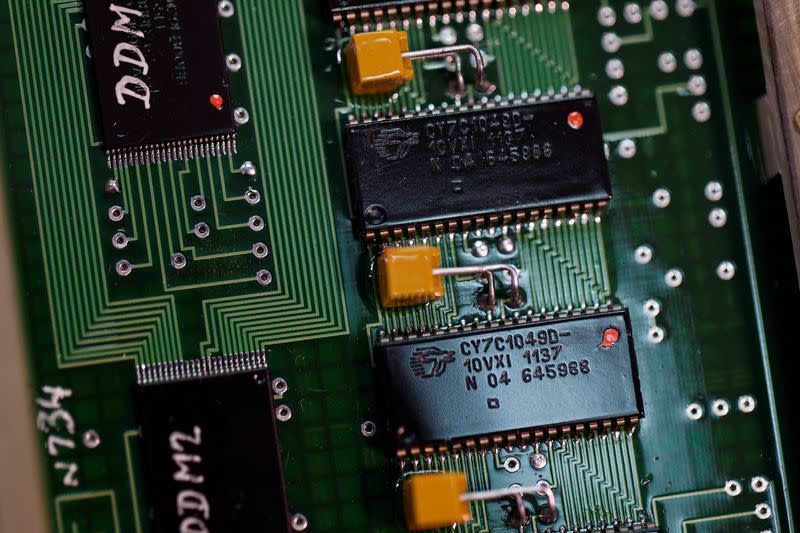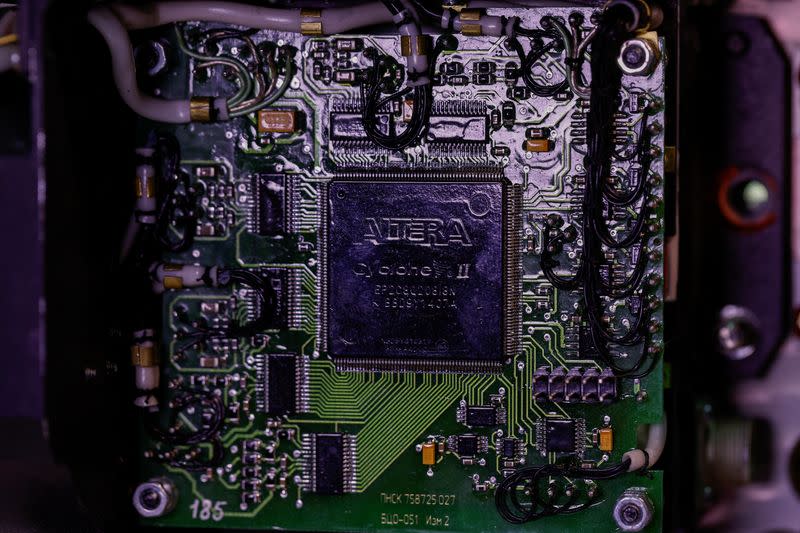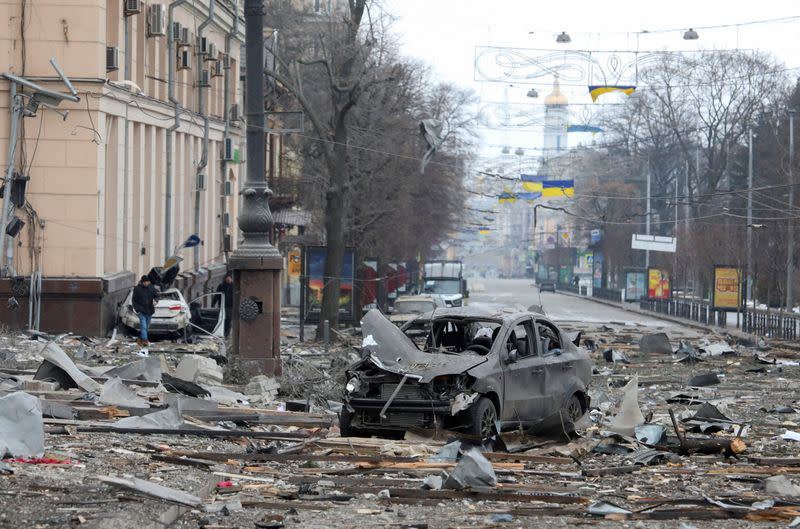Exclusive-Russian weapons in Ukraine powered by hundreds of Western parts - RUSI
By Andrew MacAskill
LONDON (Reuters) - More than 450 foreign-made components have been found in Russian weapons recovered in Ukraine, evidence that Moscow acquired critical technology from companies in the United States, Europe and Asia in the years before the invasion, according to a new report by Royal United Services Institute defence think tank.
Since the start of the war five months ago, the Ukrainian military has captured or recovered from the battlefield intact or partially damaged Russian weapons. When disassembled, 27 of these weapons and military systems, ranging from cruise missiles to air defence systems, were found to rely predominantly on Western components, according to the research shared with Reuters.
It is the most detailed published assessment to date of the part played by Western components in Russia's war against Ukraine.
About two-thirds of the components were manufactured by U.S.-based companies, RUSI found, based on the weapons recovered from Ukraine. Products manufactured by the U.S.-based Analog Devices and Texas Instruments accounted for nearly a quarter of all the Western components in the weapons.
Other components came from companies in countries including Japan, South Korea, Britain, Germany, Switzerland, and the Netherlands.
"Russian weapons that are critically dependent upon Western electronics have resulted in the deaths of thousands of Ukrainians," Jack Watling, a land warfare specialist at RUSI, told Reuters.
While many of the foreign components are found in everyday household goods such as microwaves that are not subject to export controls, RUSI said a strengthening of export restrictions and enforcement could make it harder for Russia to replenish its arsenal of weapons such as cruise missiles.
In one case, a Russian 9M727 cruise missile, one of the country's most advanced weapons that can manoeuvre at low altitude to evade radar and can strike targets hundreds of miles away, contained 31 foreign components. The parts were made by companies that included U.S-based Texas Instruments Inc and Advanced Micro Devices Inc , as well as Cypress Semiconductor, which is now owned by Infineon AG , a German company, the RUSI investigation found.
In another case, a Russian Kh-101 cruise missile, which has been used to strike Ukrainian cities, including the capital Kyiv, also had 31 foreign components with parts manufactured by companies including U.S.-based Intel Corporation and AMD-owned Xilinx.
In response to questions about how their chips ended up in Russian weapons, the companies said they comply with trade sanctions and they have stopped selling components to Russia.
Analog Devices said the company closed their business in Russia and instructed distributors to halt shipments to the country.
Texas Instruments said it follows all laws in the countries where they operate and the parts found in the Russian weapons were designed for commercial products. Intel said it "does not support or tolerate our products being used to violate human rights."
Infineon said it was "deeply concerned" if its products are being used for purposes which they were not designed for. AMD said it strictly follows all global export control laws.
Many of the foreign components only cost a few dollars and Russian companies would have been able to buy them before the start of the Ukraine invasion online through domestic or international distributors because they could be used in non-military applications.
However, more than 80 Western-manufactured microchips were subject to U.S. export controls since at least 2014 meaning they would have required a licence to be shipped to Russia, RUSI said. The companies exporting the parts had a responsibility to carry out due diligence to ensure they were not being sent to the Russian military or for a military end-use, according to RUSI.
The investigation's findings show how Russia's military remains reliant on foreign microchips for everything from tactical radios to drones and precision long-range munitions, and that Western governments were slow to limit Russia's access to these technologies particularly after President Vladimir Putin's invasion of Crimea in 2014.
Russia's war with Ukraine, which began on Feb. 24, has killed thousands of people, displaced millions more and laid waste to several cities. Russia's superior firepower, including its use of cruise and ballistic missiles, has helped its forces grind through eastern Ukraine and occupy around a fifth of the country.
Russian troops have fired more than 3,650 missiles and guided rockets in the first five months of the war, according to the Staff of the National Security and Defense Council. These include the 9M727 and Kh-101 missiles. Russian missiles have been used to hit targets including railway lines to disrupt Western supply lines, military infrastructure and civilian targets such as shopping centres and hospitals. Russia said it has only fired at military targets. Russian authorities didn't provide further comment for this story.
In the aftermath of the invasion of Ukraine, the United States announced sweeping sanctions to try to weaken Russia's economy and its military. This included a ban on many sensitive microchips being sold to Russia. Countries in Europe, as well as Japan, Taiwan, and South Korea - all key chipmaking countries – have announced similar restrictions. Russia characterises the conflict as a special military operation meant to disarm Ukraine. Moscow has cast the sanctions as a hostile act and has denied targeting civilians.
Russia is currently working to find new routes to secure access to Western microchips, according to RUSI. Many components are sold through distributors operating in Asia, such as Hong Kong, which acts as a gateway for electronics making their way to the Russian military or companies acting on its behalf, RUSI found.
Russia's government did not respond to a request for comment.
The U.S. government said in March that Russian firms were front companies that have been buying up electronics for Russia's military. Russian customs records show that in March last year one company imported $600,000 worth of electronics manufactured by Texas Instruments through a Hong Kong distributor, RUSI said. Seven months later, the same company imported another $1.1 million worth of microelectronics made by Xilinx, RUSI said.
Texas Instruments and AMD-owned Xilinx did not respond to a request for comment about the customs data.
Russia's military could be permanently weakened if Western governments strengthen export controls, manage to shut down the country's clandestine procurement networks and prevent sensitive components being manufactured in states that support Russia, RUSI said.
((reporting by Andrew MacAskill; edited by Janet McBride))





